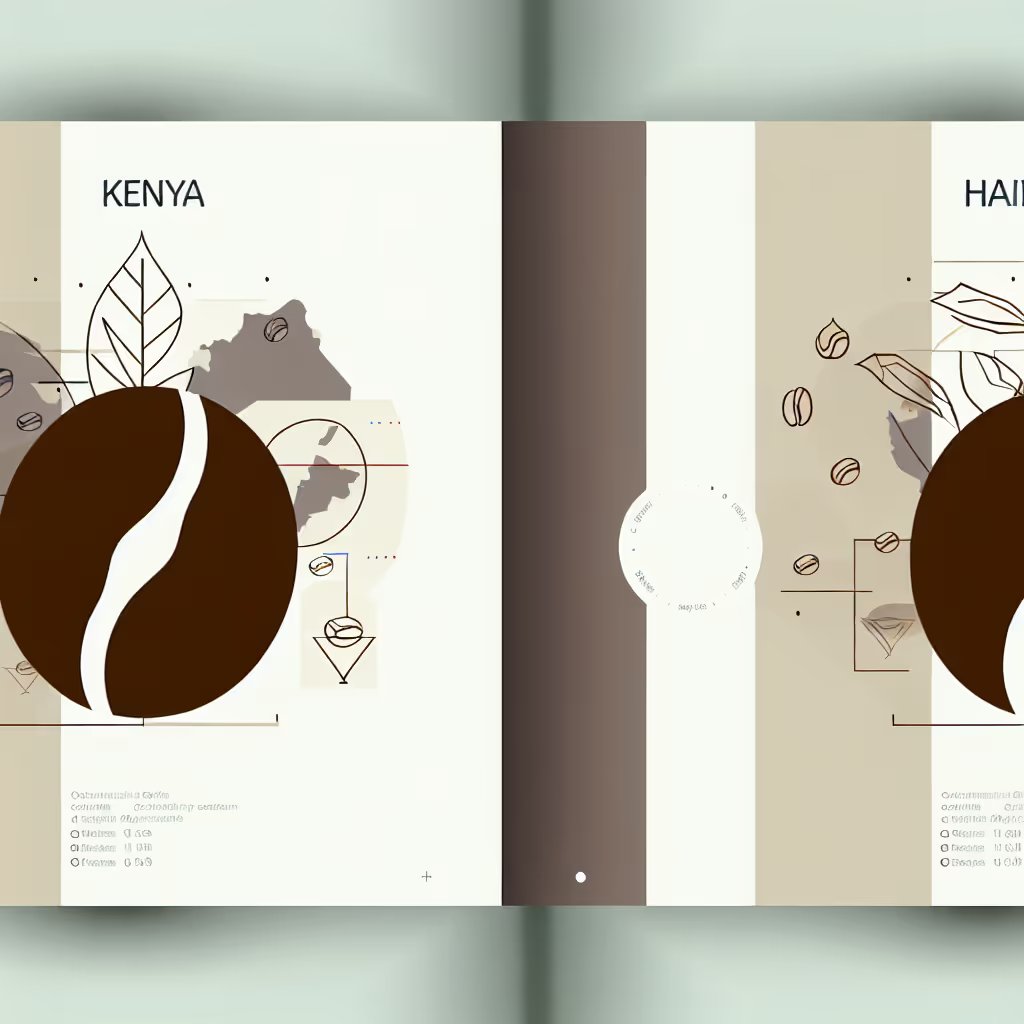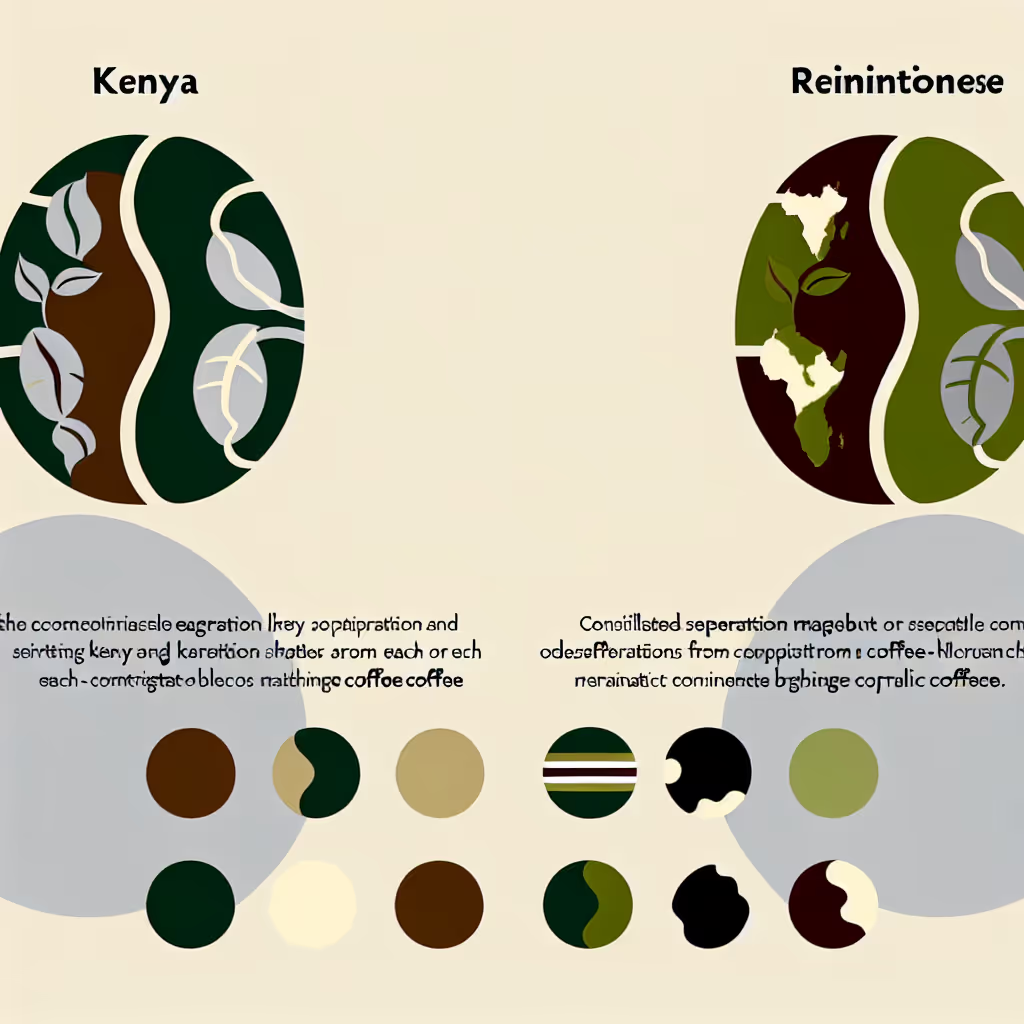Kenyan Vs. Haitian Coffee
This comparison explores the unique qualities of Kenyan and Haitian coffee, examining their flavor profiles, growing conditions, and brewing methods to help coffee enthusiasts make informed choices.

Brief Description
Kenyan coffee is renowned for its bright acidity, full body, and complex flavor profile. Grown in the rich volcanic soils of the Central Highlands, these beans benefit from ideal climate conditions and meticulous processing. The result is a cup that's bold, wine-like, and often described as the 'connoisseur's choice'. With notes ranging from blackcurrant to citrus, Kenyan coffee offers a truly unique and memorable tasting experience.
Haitian coffee is a hidden gem in the coffee world, known for its rich history and unique flavor profile. Grown in the mountainous regions of Haiti, particularly in the Plateau Central, these beans offer a delightful combination of bright acidity and full body. Despite facing numerous challenges, Haitian coffee farmers have persevered, producing beans that are gaining recognition for their exceptional quality and distinctive taste.
Importance of Comparison
Comparing Kenyan and Haitian coffee is crucial for coffee lovers seeking to expand their palate and understand the nuances of single-origin beans. These two origins offer distinct flavor profiles and represent different coffee-growing regions, providing insight into how geography, climate, and processing methods influence taste. By exploring these differences, consumers can make more informed purchasing decisions and appreciate the diversity of the coffee world.
Key Attributes
Origin
Kenyan
Haitian


Consumer Guide
When choosing between Kenyan and Haitian coffee, consider your flavor preferences. Kenyan coffee is known for its bright acidity and complex flavors, with notes of blackcurrant, citrus, and floral undertones. It's ideal for those who enjoy a bold, wine-like cup. Haitian coffee offers a balanced profile with chocolate, citrus, and nutty notes, appealing to those who prefer a smoother taste. Consider brewing methods: Kenyan coffee excels in pour-over and cold brew, while Haitian coffee shines in French press and espresso. Altitude also plays a role, with Kenyan beans grown at higher elevations (1400-2100m) compared to Haitian beans (800-1500m). Lastly, consider supporting Haitian coffee to contribute to the country's economic recovery through ethical coffee purchases.
Expert Opinions
Coffee expert Maria Rodriguez notes, 'Kenyan coffee is often considered the pinnacle of brightness and complexity in the coffee world. Its unique double fermentation process contributes to its distinctive flavor.' On Haitian coffee, master roaster John Smith comments, 'Haiti's coffee is a hidden treasure. The combination of lower altitude and varied processing methods results in a versatile bean that's excellent for blends or as a single-origin offering. It's a great choice for those who find Kenyan coffee too intense.'
FAQs
Kenyan coffee is known for its bright acidity and complex flavors, featuring notes of blackcurrant, citrus, and floral undertones. Haitian coffee, on the other hand, offers a more balanced profile with chocolate, citrus, and nutty notes. Kenyan coffee tends to be bolder and more wine-like, while Haitian coffee is generally smoother and more versatile.
Kenyan coffee is typically grown at higher altitudes (1400-2100m) in the volcanic soils of the Central Highlands, benefiting from ideal climate conditions. Haitian coffee is grown at lower altitudes (800-1500m) in mountainous regions, particularly the Plateau Central. These differences in altitude and soil composition contribute to the distinct flavor profiles of each origin.
For Kenyan coffee, pour-over, French press, and cold brew methods are excellent choices to highlight its bright acidity and complex flavors. Haitian coffee performs well with French press, pour-over, and espresso brewing methods, showcasing its balanced profile and versatility. Experiment with different methods to find your preferred way of enjoying each origin.
Kenyan coffee is typically processed using the washed method, often with a unique double fermentation process, followed by sun-drying. This contributes to its clean, bright flavor profile. Haitian coffee uses a variety of processing methods, including washed, natural, and honey processing. This diversity in processing allows for a range of flavor profiles within Haitian coffee.
Kenya produces significantly more coffee annually, with an average output of 50,000 metric tons. Haiti's annual production is lower, at around 15,000 metric tons. This difference in production volume can affect availability and pricing of these coffees in the global market.
To support sustainable coffee farming in both countries, look for beans certified by organizations like Fair Trade, Rainforest Alliance, or UTZ. For Kenyan coffee, seek out cooperatives that ensure fair prices for farmers. When buying Haitian coffee, consider brands that directly support local farmers and contribute to Haiti's economic recovery through ethical sourcing practices.
Conclusion
Both Kenyan and Haitian coffees offer unique and rewarding experiences for coffee enthusiasts. Kenyan coffee stands out for its bright acidity, complex flavors, and wine-like qualities, making it a favorite among connoisseurs. Haitian coffee, with its balanced profile and chocolate-nutty notes, provides a smoother, more versatile option. Your choice between the two may depend on your flavor preferences, brewing methods, and desire to support different coffee-growing regions. Whichever you choose, both origins offer a chance to explore the rich diversity of the coffee world and appreciate the distinct characteristics that geography, climate, and processing methods impart on these exceptional beans.






